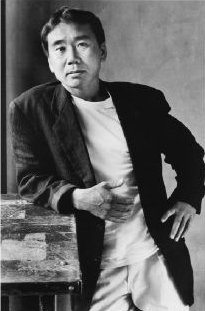After the Quake (14 page)

“Sounds like fun to me,” Junpei said.
“Please, Mommy, show Junpei. Just once. If you do it, I’ll go to bed right away.”
“Oh, what’s the use,” Sayoko muttered. She took off her digital watch and handed it to Sala. “Now, you’re not going to give me any more trouble about going to bed, right? OK, get ready to time me when I count to three.”
Sayoko was wearing a baggy black crewneck sweater. She put both hands on the table and counted, “One . . . two . . . three! ” Like a turtle pulling into its shell, she slipped her right hand up inside her sleeve, and then there was a light back-scratching kind of movement. Out came the right hand again, and the left hand went up its sleeve. Sayoko turned her head just a bit, and the left hand came out holding a white bra—a small one with no wires. Without the slightest wasted motion, the hand and bra went back up the sleeve, and the hand came out again. Then the right hand pulled in, poked around at the back, and came out again. The end. Sayoko rested her right hand on her left on the table.
“Twenty-five seconds,” Sala said. “That’s great, Mommy, a new record! Your best time so far was thirty-six seconds.”
Junpei applauded. “Wonderful! Like magic.”
Sala clapped her hands, too. Sayoko stood up and announced, “All right, show time is over. To bed, young lady. You promised.”
Sala kissed Junpei on the cheek and went to bed.
Sayoko stayed with her until her breathing was deep and steady, then rejoined Junpei on the sofa. “I have a confession to make,” she said. “I cheated.”
“Cheated?”
“I didn’t put the bra back on. I just pretended. I slipped it out from under my sweater and dropped it on the floor.”
Junpei laughed. “What a terrible mother!”
“I wanted to make a new record,” she said, narrowing her eyes with a smile. He hadn’t seen her smile in that simple, natural way for a long time. Time wobbled on its axis inside him, like curtains stirring in a breeze. He reached for Sayoko’s shoulder, and her hand took his. They came together on the sofa in a powerful embrace. With complete naturalness, they wrapped their arms around each other and kissed. It was as if nothing had changed since the time they were nineteen. Sayoko’s lips had the same sweet fragrance.
“We should have been like this to begin with,” she whispered after they had moved from the sofa to her bed. “But you didn’t get it. You just didn’t get it. Not till the salmon disappeared from the river.”
They took off their clothes and held each other gently. Their hands groped clumsily, as if they were having sex for the first time in their lives. They took their time, until they knew they were ready, and then at last he entered Sayoko and she drew him in.
None of this seemed real to Junpei. In the half-light, he felt as if he were crossing a deserted bridge that went on and on forever. He moved, and she moved with him. Again and again he wanted to come, but he held back, fearing that, once it happened, the dream would end and everything would vanish.
Then, behind him, he heard a slight creaking sound. The bedroom door was easing open. The light from the hallway took the shape of the door and fell on the rumpled bedclothes. Junpei raised himself and turned to see Sala standing against the light. Sayoko held her breath and moved her hips away, pulling him out. Gathering the sheets to her breast, she used one hand to straighten her hair.
Sala was not crying or screaming. Her right hand gripping the doorknob, she just stood there, looking at the two of them but seeing nothing, her eyes focused on emptiness.
Sayoko called her name.
“The man told me to come here,” Sala said in a flat voice, like someone who has just been ripped out of a dream.
“The man?” Sayoko asked.
“The Earthquake Man. He came and woke me up. He told me to tell you. He said he has the box ready for everybody. He said he’s waiting with the lid open. He said I should tell you that, and you’d understand.”
Sala slept in Sayoko’s bed that night. Junpei stretched out on the living room sofa with a blanket, but he could not sleep. The TV faced the sofa, and for a very long time he stared at the dead screen.
They
were inside there. They were waiting with the box open. He felt a chill run up his spine, and no matter how long he waited, it would not go away.
He gave up trying to sleep and went to the kitchen. He made himself some coffee and sat at the table to drink it, but he felt something bunched up under one foot. It was Sayoko’s bra. He picked it up and hung it on the back of a chair. It was a simple, lifeless piece of white underwear, not particularly big. It hung over the kitchen chair in the predawn darkness like some anonymous witness who had wandered in from a time long past.
He thought about his early days in college. He could still hear Takatsuki the first time they met in class saying, “Hey, let’s get something to eat,” in that warm way of his, and he could see Takatsuki’s friendly smile that seemed to say,
Hey, relax. The
world is just going to keep getting better and better.
Where did we eat that time? Junpei wondered, and what did we have? He couldn’t remember, though he was sure it was nothing special.
“Why did you choose me to go to lunch with?” Junpei had asked him that day. Takatsuki smiled and tapped his temple with complete confidence. “I have a talent for picking the right friends at the right times in the right place.”
He was right, Junpei thought, setting his coffee mug on the kitchen table. Takatsuki
did
have an intuitive knack for picking the right friends. But that was not enough. Finding one person to love over the long haul of one’s life was quite a different matter from finding friends. Junpei closed his eyes and thought about the long stretch of time that had passed through him. He did not want to think of it as something he had merely used up without any meaning.
As soon as Sayoko woke in the morning, he would ask her to marry him. He was sure now. He couldn’t waste another minute. Taking care not to make a sound, he opened the bedroom door and looked at Sayoko and Sala sleeping bundled in a comforter. Sala lay with her back to Sayoko, whose arm was draped on Sala’s shoulder. He touched Sayoko’s hair where it fell across the pillow, and caressed Sala’s small pink cheek with the tip of his finger. Neither of them stirred. He eased himself down to the carpeted floor by the bed, his back against the wall, to watch over them in their sleep.
Eyes fixed on the hands of the wall clock, Junpei thought about the rest of the story for Sala—the tale of Masakichi and Tonkichi. He had to find a way out. He couldn’t just leave Tonkichi stranded in the zoo. He had to save him. He retraced the story from the beginning. Before long, the vague outline of an idea began to sprout in his head, and, little by little, it took shape.
Tonkichi had the same thought as Sala: he would use the honey that Masakichi had collected to bake honey pies. It didn’t take him long to realize that he had a real talent for making crisp, delicious honey pies. Masakichi took the honey pies to town and sold them to the people there. The people loved Tonkichi’s pies and bought them by the dozen. So Tonkichi and Masakichi never had to separate again: they lived happily ever after in the mountains, best friends forever.
Sala would be sure to love the new ending. And so would Sayoko.
I want to write stories that are different from the ones I’ve written so far, Junpei thought: I want to write about people who dream and wait for the night to end, who long for the light so they can hold the ones they love. But right now I have to stay here and keep watch over this woman and this girl. I will never let anyone—not anyone—try to put them into that crazy box—not even if the sky should fall or the earth crack open with a roar.

haruki murakami
after the quake
Born in Kyoto, Japan, in 1949, Haruki Murakami grew up in Kobe and now lives near Tokyo. The most recent of his many honors is the Yomiuri Literary Prize, whose previous recipients include Yukio Mishima, Kenzaburo Oe, and Kobo Abe. His work has been translated into twenty-seven languages.

INTERNATIONAL
books by haruki murakami
after the quake
Sputnik Sweetheart
Underground: The Tokyo Gas Attack and the Japanese Psyche
(nonfiction)
South of the Border, West of the Sun
The Wind-Up Bird Chronicle
Dance Dance Dance
The Elephant Vanishes
Norwegian Wood
Hard-Boiled Wonderland and the End of the World
A Wild Sheep Chase

FIRST VINTAGE INTERNATIONAL EDITION, MAY 2003
Copyright © 2002 by Haruki Murakami
Title page art: Moonscape © 200
2
by Iris Weinstein
Vintage is a registered trademark and Vintage International and colophon are trademarks of Random House, Inc.
“Super-Frog Saves Tokyo” was originally published in
GQ.
“Thailand” was originally published in
Granta.
“All God’s Children Can Dance” was originally published in
Harper’s.
“UFO in Kushiro” and “Honey Pie” were originally published in
The New Yorker.
“Landscape with Flatiron” was originally published in
Ploughshares.
The Library of Congress has cataloged the Knopf edition as follows: Murakami, Haruki
[Kami no kodomo-tachi wa mina odoru. English]
After the quake: stories / Haruki Murakami; translated from the Japanese by Jay Rubin.—1st American ed.
p. cm.
Contents: UFO in Kushiro—Landscape with flatiron—All god’s children can dance—Thailand—Super-frog saves Tokyo—Honey pie.
eISBN: 978-0-307-42464-8
v3.0
